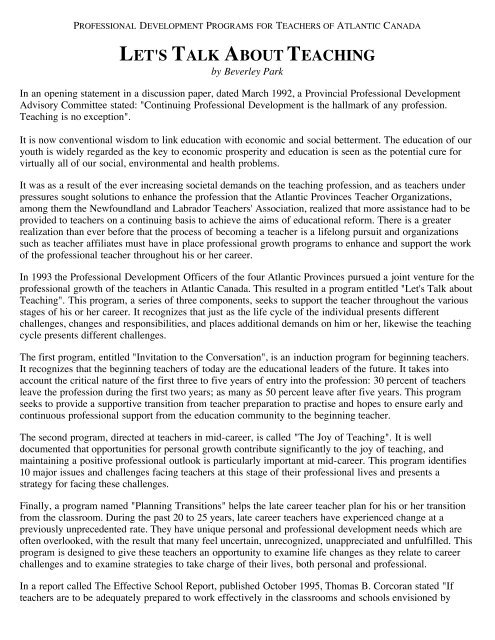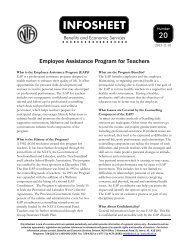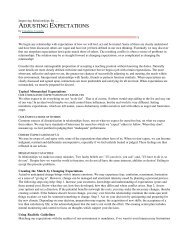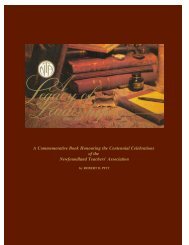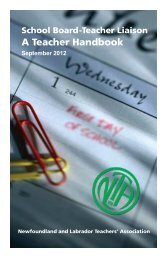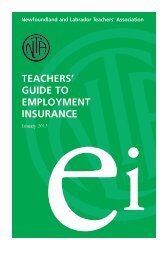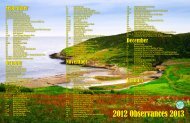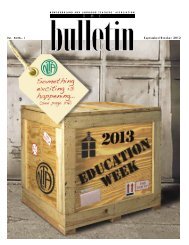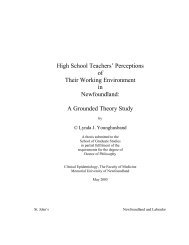The Bulletin, Vol. 40, No. 1 September/October 1996 from the NL ...
The Bulletin, Vol. 40, No. 1 September/October 1996 from the NL ...
The Bulletin, Vol. 40, No. 1 September/October 1996 from the NL ...
- No tags were found...
Create successful ePaper yourself
Turn your PDF publications into a flip-book with our unique Google optimized e-Paper software.
PROFESSIONAL DEVELOPMENT PROGRAMS FOR TEACHERS OF ATLANTIC CANADALET'S TALK ABOUT TEACHINGby Beverley ParkIn an opening statement in a discussion paper, dated March 1992, a Provincial Professional DevelopmentAdvisory Committee stated: "Continuing Professional Development is <strong>the</strong> hallmark of any profession.Teaching is no exception".It is now conventional wisdom to link education with economic and social betterment. <strong>The</strong> education of ouryouth is widely regarded as <strong>the</strong> key to economic prosperity and education is seen as <strong>the</strong> potential cure forvirtually all of our social, environmental and health problems.It was as a result of <strong>the</strong> ever increasing societal demands on <strong>the</strong> teaching profession, and as teachers underpressures sought solutions to enhance <strong>the</strong> profession that <strong>the</strong> Atlantic Provinces Teacher Organizations,among <strong>the</strong>m <strong>the</strong> Newfoundland and Labrador Teachers' Association, realized that more assistance had to beprovided to teachers on a continuing basis to achieve <strong>the</strong> aims of educational reform. <strong>The</strong>re is a greaterrealization than ever before that <strong>the</strong> process of becoming a teacher is a lifelong pursuit and organizationssuch as teacher affiliates must have in place professional growth programs to enhance and support <strong>the</strong> workof <strong>the</strong> professional teacher throughout his or her career.In 1993 <strong>the</strong> Professional Development Officers of <strong>the</strong> four Atlantic Provinces pursued a joint venture for <strong>the</strong>professional growth of <strong>the</strong> teachers in Atlantic Canada. This resulted in a program entitled "Let's Talk aboutTeaching". This program, a series of three components, seeks to support <strong>the</strong> teacher throughout <strong>the</strong> variousstages of his or her career. It recognizes that just as <strong>the</strong> life cycle of <strong>the</strong> individual presents differentchallenges, changes and responsibilities, and places additional demands on him or her, likewise <strong>the</strong> teachingcycle presents different challenges.<strong>The</strong> first program, entitled "Invitation to <strong>the</strong> Conversation", is an induction program for beginning teachers.It recognizes that <strong>the</strong> beginning teachers of today are <strong>the</strong> educational leaders of <strong>the</strong> future. It takes intoaccount <strong>the</strong> critical nature of <strong>the</strong> first three to five years of entry into <strong>the</strong> profession: 30 percent of teachersleave <strong>the</strong> profession during <strong>the</strong> first two years; as many as 50 percent leave after five years. This programseeks to provide a supportive transition <strong>from</strong> teacher preparation to practise and hopes to ensure early andcontinuous professional support <strong>from</strong> <strong>the</strong> education community to <strong>the</strong> beginning teacher.<strong>The</strong> second program, directed at teachers in mid-career, is called "<strong>The</strong> Joy of Teaching". It is welldocumented that opportunities for personal growth contribute significantly to <strong>the</strong> joy of teaching, andmaintaining a positive professional outlook is particularly important at mid-career. This program identifies10 major issues and challenges facing teachers at this stage of <strong>the</strong>ir professional lives and presents astrategy for facing <strong>the</strong>se challenges.Finally, a program named "Planning Transitions" helps <strong>the</strong> late career teacher plan for his or her transition<strong>from</strong> <strong>the</strong> classroom. During <strong>the</strong> past 20 to 25 years, late career teachers have experienced change at apreviously unprecedented rate. <strong>The</strong>y have unique personal and professional development needs which areoften overlooked, with <strong>the</strong> result that many feel uncertain, unrecognized, unappreciated and unfulfilled. Thisprogram is designed to give <strong>the</strong>se teachers an opportunity to examine life changes as <strong>the</strong>y relate to careerchallenges and to examine strategies to take charge of <strong>the</strong>ir lives, both personal and professional.In a report called <strong>The</strong> Effective School Report, published <strong>October</strong> 1995, Thomas B. Corcoran stated "Ifteachers are to be adequately prepared to work effectively in <strong>the</strong> classrooms and schools envisioned by


